Infrastructure Planning and Facilities: 2024 Year in Review

Danielle Fowler
January 30, 2025
Infrastructure Planning and Facilities (IPF) celebrated a year of innovation, sustainability, and operational excellence, underpinned by significant contributions to environmental stewardship, community engagement, and campus infrastructure.
Environmental Stewardship and Sustainability
- Red Cedar River Cleanup. IPF Landscape Services launched a bi-annual river cleanup initiative, removing invasive species and hosting magnet fishing events. A standout effort in June led to the removal of 20 bicycles, four electric scooters, and scrap metal near the Bogue Street bridge.
- Landscape Enhancements. Collaborating with Student Life and Engagement (SLE), over 5,000 bulbs were planted along the Red Cedar River during Family Fun Weekend, enhancing campus beauty for spring.
- Recycling Leadership. The Surplus Store & Recycling Center (SSRC) excelled in the Campus Race to Zero Waste competition, earning top honors in cardboard, bottles, cans, and paper recycling categories. SSRC also introduced a beer can recycling initiative, recovering $8,000 in revenue. In 2024, SSRC recycled 5.7 million pounds of material, diverted 3.7 million pounds of surplus items and non-traditional recyclables (like polystyrene and toner cartridges), and collected 2.7 million pounds of organic material to be processed for composting or anaerobic digestion. SSRC continues to reduce the overall amount of material sent to landfills even as student enrollment reaches all-time highs.
- Move-in and Move-out. SSRC collected over 100,000 pounds of cardboard, and over 3 full-sized semi-trailer loads of polystyrene during the week of student move-in. They also collected over 600,000 pounds of materials from residence halls during student move-out.
- Renewable Energy. MSU joined the Consumers Energy renewable energy program to advance the university goals of reducing greenhouse gas emissions.
- Solar Light Towers. The Materials and Logistics department implemented the use of 46 solar light towers during fall campus events, reducing diesel fuel consumption by 1,000 gallons and keeping 1,200 pounds of carbon dioxide out of the air, contributing to a cleaner and more sustainable football season.
- An Electrified Fleet. The electric vehicles in MSU’s fleet traveled a total of 117,812 miles in 2024. IPF’s Transportation Services also became a new stakeholder of Michigan Advanced Biofuels Coalition (MiABC) to help support the use of sustainable fuels to improve the state’s air quality and reduce greenhouse gas emissions. The on-campus fuel station has used biodiesel for the past twelve years.
- Upgrading our Fuel. This year the on-campus fuel station shifted from a 5 percent biodiesel blend to a 20 percent blend as part of a significant shift towards renewable energy.
- Battery-powered Mowing. IPF's Landscape Services is using data and technology to make smarter decisions and get more done with the help of innovative equipment, like robotic lawn mowers. These mowers take care of routine lawn maintenance, freeing up team members to focus on other complex tasks around campus.
- Bicycle-friendly University. The League of American Bicyclists has renewed MSU’s gold rating as a Bike Friendly University. Within a pool of 209 awardees nationwide, MSU is among only 11 campuses renewing a gold rating this year.
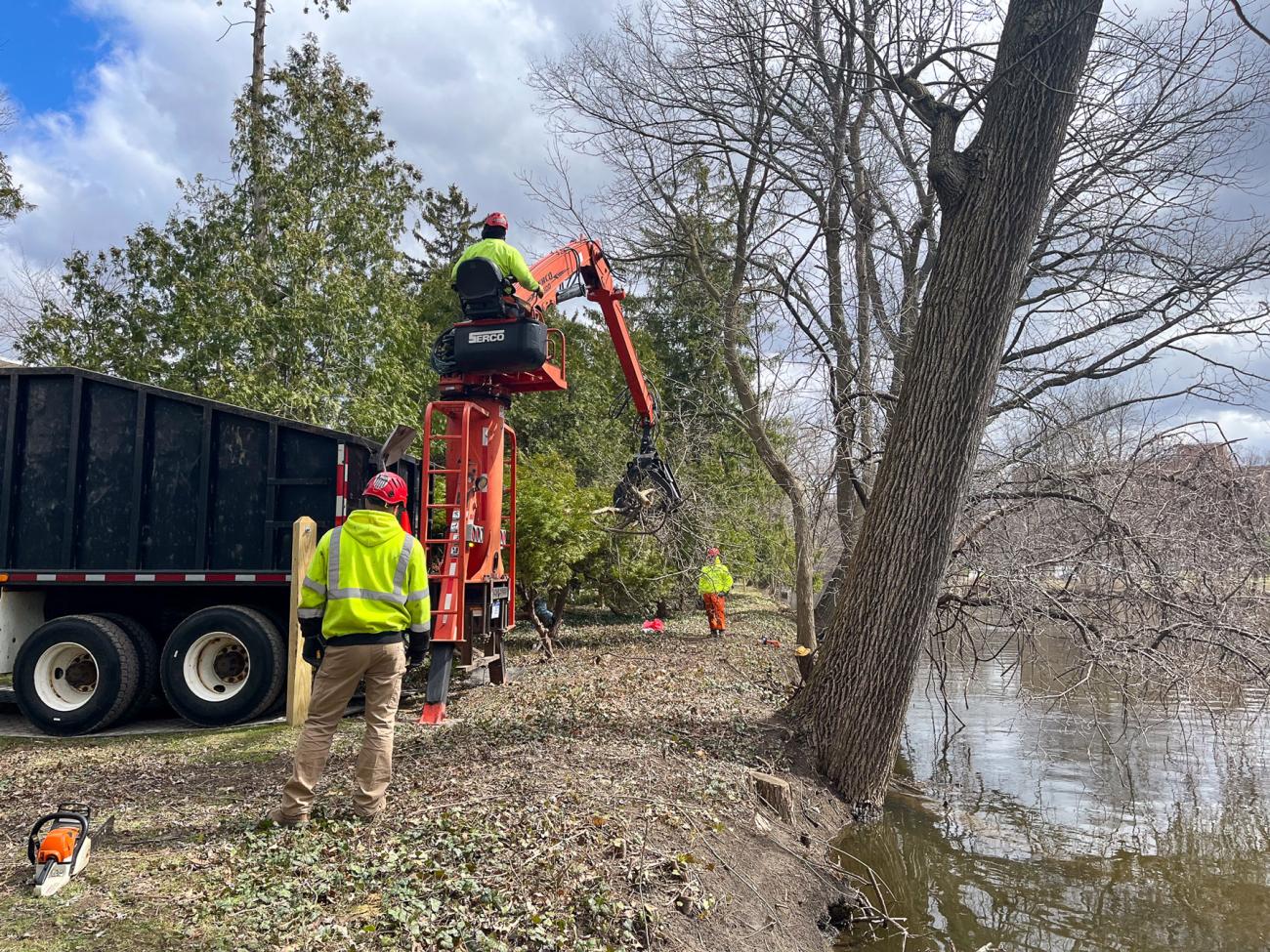
The new bi-annual Red Cedar River cleanups help preserve the banks of the river that flows through campus.
Operational Excellence
- Service Optimization. Planon, the integrated work management system used by the Controller's Office Financial Reporting, Infrastructure Planning and Facilities, Institutional Space Planning Management (ISPM), MSU Information Technology, Student Life and Engagement, and University Procurement and Logistics, went live in January. This new system provides more transparency and data consistency, and standardizes processes across departments. Ongoing integration efforts ensure access to historical and real-time data for informed decision-making.
- Procurement Savings. Materials & Logistics placed over 12,000 purchase orders, a 9 percent increase from last year, and achieved $726,296 in cost savings. 14.7 percent of the total spending was with diverse suppliers.
- Maintaining the Fleet: A new wash bay at Landscape Services was opened to address corrosion and rust on landscape fleet vehicles, which is the cause of 70-80 percent of breakdowns. This solution helps staff wash large equipment efficiently and quickly, extending the useable life of the equipment.
- Water Treatment Plant: On any given day, the MSU Water Treatment Plant pumps about 4 million gallons of water to ensure the 60,000 students, faculty and staff on campus can fill their water bottles, flush toilets and wash dishes. Water flows through the power plant to create steam that powers the university, heats buildings in the winter, and cools them in the summer.
- Setting Up. The IPF Setup Crew handled approximately 2,500 work orders in 270 different buildings for over 200 different departments in 2024, including move jobs, logistical support, and event support.
- Keeping Up. The Facilities Service Center processed 10,558 general service requests, 19,948 trouble call orders, and had over 83,173 documented customer contacts all to keep MSU running 24/7/365.
- Facilities Service Center Launched. In June of 2024, the IPF Facilities Service Center was formed to strategically align multiple services into a centralized department within the IPF Operations umbrella. Doing so allows for enhanced planning, daily habits and routines, and team focus and prioritization. Over 10,000 general service requests were processed in 2024, along with close to 20,000 trouble call orders.
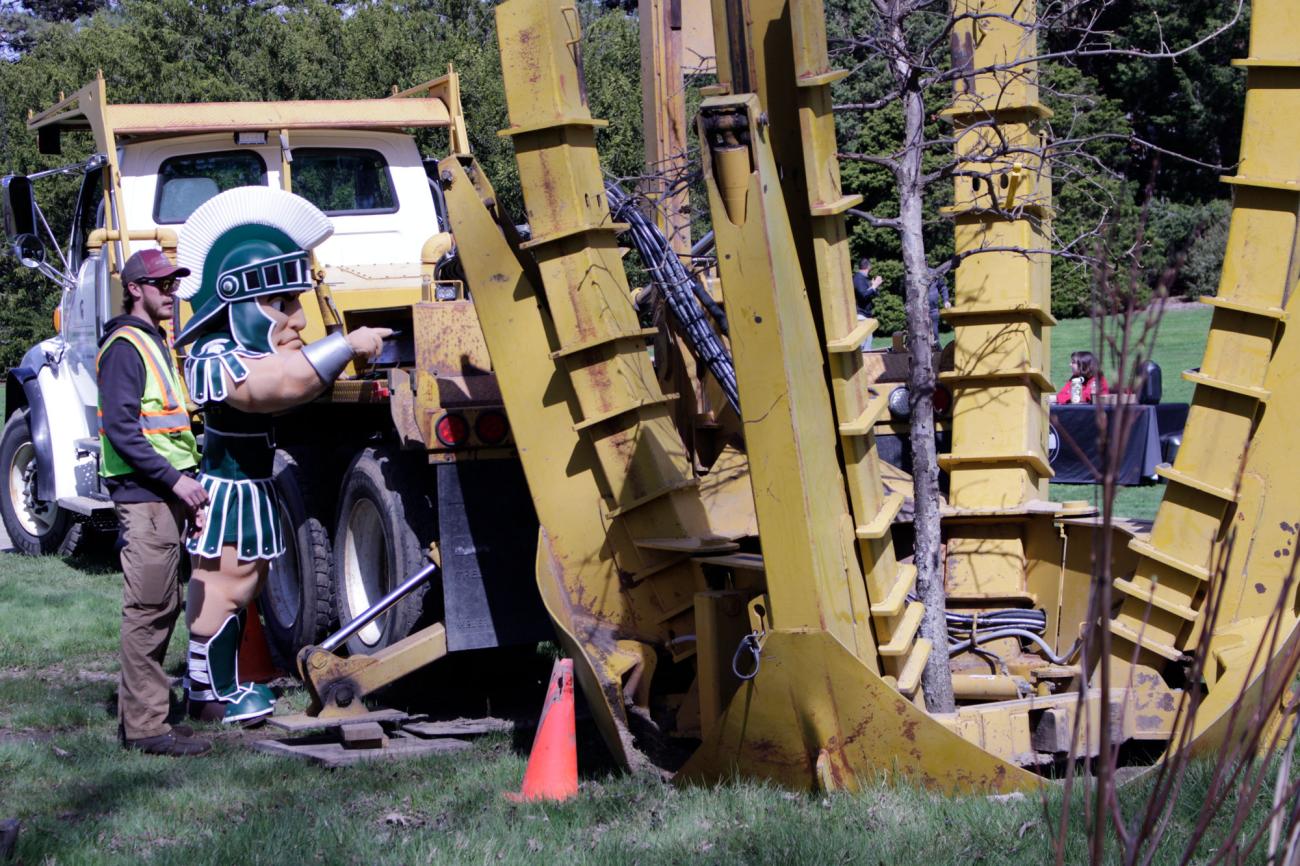
New trees are planted on campus every year, adding to our urban arboretum.
Customer Service & Employee Development
- New Trouble Truck. IPF launched a plumbing and mechanical weekend trouble truck in parallel with the existing electrical weekend trouble truck in July. This provides a higher level of service to the campus and results in a quicker response to after-hours mechanical and plumbing issues.
- Supervisor Equivalency Program. IPF’s Supervisor Equivalency Program, now in its second year, provides IPF team members with the opportunity to develop their leadership skills, gain hands-on supervisory experience, and help advance their careers.
- Engaging the Workforce. The IPF Workforce Engagement Committee and the IPF DEI Council were combined to enhance employee engagement and experiences, ensuring that every team member feels valued, supported, and inspired to thrive. The revamped committee is made up of two subcommittees and the IPF Spartner Program. Workforce Advisors Subcommittee focused on engaging the workforce through pulse surveys and the IPF suggestion box to identify opportunities to enhance the employee experience at IPF. The Recognition and Inclusion Subcommittee focused on coordination of unit-wide engagements like Take Your Child to Work Day activities and IPF Fall Donations efforts.
- Teaming up for Health. In addition to various employee activities, the IPF Workforce Engagement Committee organized a free health fair for Landscape Services in collaboration with the College of Osteopathic Medicine.
- Jack Breslin Distinguished Staff Award. A member of the IPF team, Darwin Meirndorf, received one of MSU’s highest staff honors this year, one of only six honorees.
- Training Future Tradespeople. The Women in Skilled Trades (WIST) program, an apprenticeship readiness program for women who want to enter the construction skilled trades industry, received the Excellence in Diversity Award from MSU.
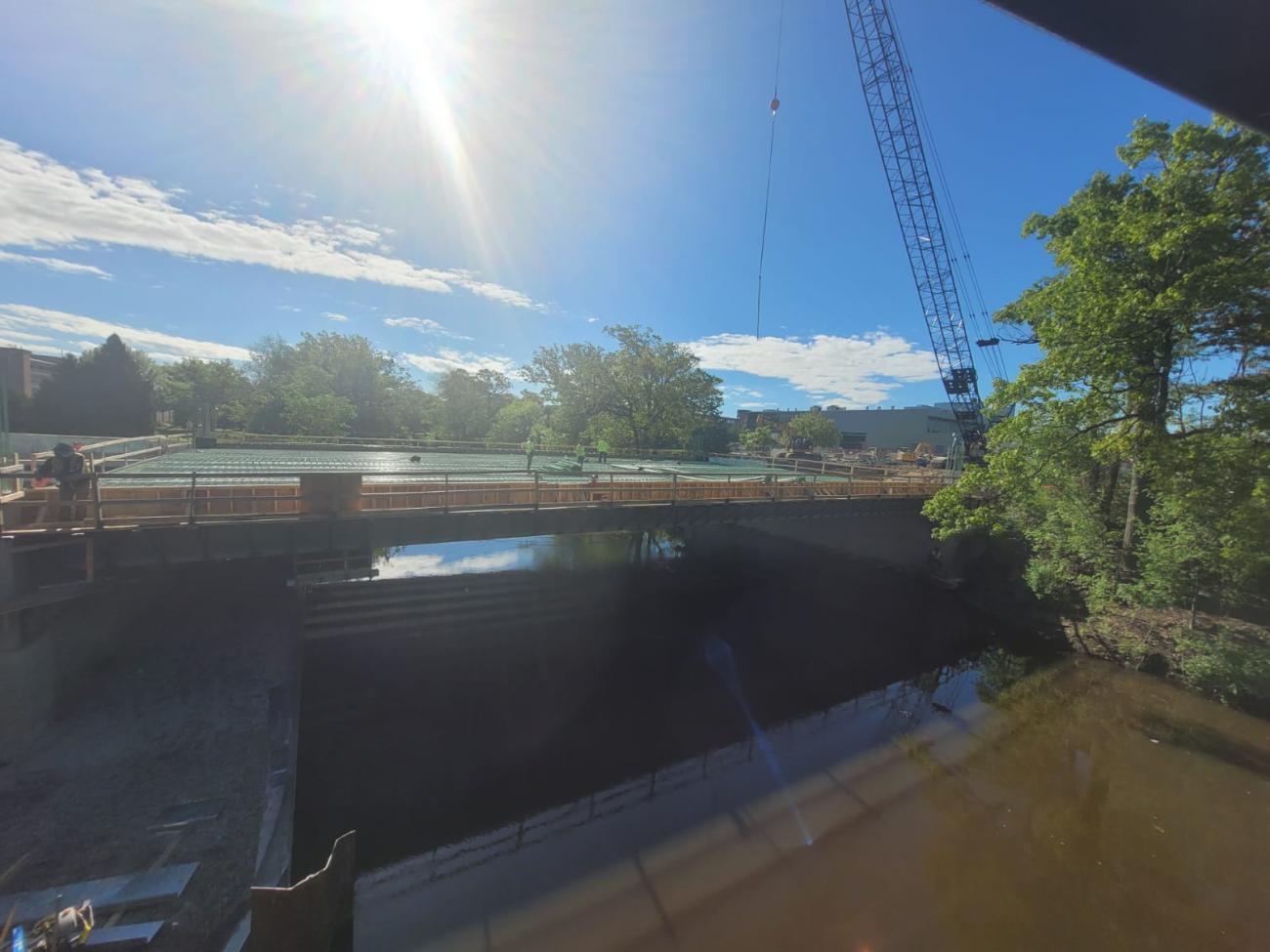
The new Farm Lane Bridge (and pedestrian bridge) connect north and south campus, shown here under construction.
Community Collaboration and Educational Engagement
- Workshops and Events. The Surplus Store and Recycling Center hosted workshops on upcycling and vermicomposting, while the Earth Bash event drew 300 participants to learn about sustainability.
- Tours and Collaboration. Over 500 participants toured Power and Water facilities, aligning visits with academic curricula. Hidden Lake Gardens welcomed 82,824 visitors, hosted numerous community events, and saw a 50% membership increase compared to the previous year.
- Youth Programs. The Demmer Center’s Junior Olympic Archery Development (JOAD) program reached record enrollment, with junior archers winning national titles and breaking records.
- Domicology Exhibit. IPF’s Surplus Store and Recycling Center, in collaboration with the MSU Museum, created a new exhibit called Domicology: The Life Cycle of Our Built Environment, a first-of-its-kind exhibit focused on material salvage and building design. The exhibit included highlights from SSRC’s construction and demolition diversion program, which recovers materials from campus building projects.
- Boys and Girls Club of Lansing. Landscape Services extended its outreach to the Lansing Boys and Girls Club, rejuvenating landscapes and soccer fields and providing picnic tables made from recycled wood for over 200 children.
- Earth Bash. The Surplus Store and Recycling Center hosted Earth Bash, a public education event for 230 MSU community members with partners from the Science Festival, Office of Sustainability, Student Eco Reps, Center for Community and Economic Development, MSU Vote, student group PIRGIM, Impact Radio, and Lansing’s Scrap Fest.
- Interdepartmental Training. IPF partnered with the Chief Preparator of Exhibitions of the Broad Art Museum to create a training, assessment, and certification program for set-up workers that streamlines operations and reduces costs. By keeping the handling of fine art in-house, the museum can ensure more control over the process, while also increasing the efficiency and safety of art handling. This type of approach not only saves money but also builds internal expertise.
- On-Campus Events. The IPF Events office received and processed 2,500 event requests including the B1G Ten Gymnastics Championships, B1G Ten Hockey Championships, the 2024 National Science Olympiad Tournament, the first Commemoration of February 13th, the Harris for President Rally, an extensive list of Fall Welcome activities, and much more.
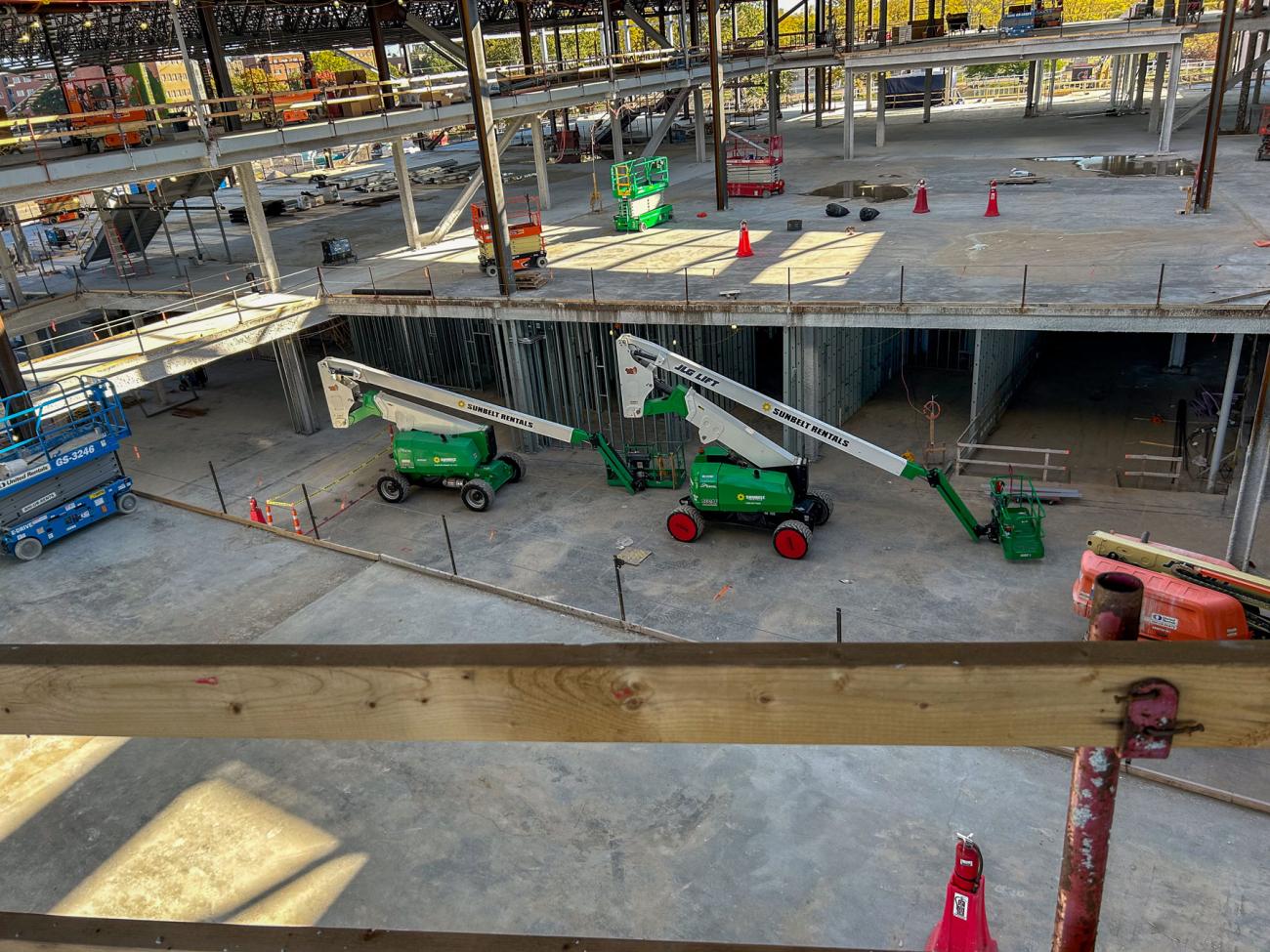
The new Student Recreation and Wellness Center began to take shape in 2024 on the corner of West Shaw Lane and Birch Road.
Infrastructure and Facility Development
- Farm Lane Bridge. This $44 million project, completed on time and under budget, saw the reconstruction of the Farm Lane Bridge, originally built in 1936. This new bridge, the only bridge on campus that sits above the 100-year flood elevation, along with the new pedestrian bridge, significantly improves campus mobility. View a timelapse video of the bridge’s construction.
- Vision 2050 Facility & Land Use Plan. The Board of Trustees approved a long-term framework for infrastructure development that positions MSU for sustainable growth and innovation. Vision 2050: An Integrated Facilities and Land Use Plan is the result of nearly two years of engagement with the Spartan community.
- Get Your Game On. IPF partnered with Dell Technologies to create the new Alienware Esports Lounge, an elite gaming environment for students to train and compete in esports at the highest level.
- Chemistry Lab Expansion. This project created radiochemistry labs to allow the Facility for Rare Isotope Beams (FRIB) to expand multi-disciplinary collaboration, generate new intellectual property, and stimulate additional federal investment. IPF also renovated laboratories on the second, third, and fifth floors of the Chemistry Building to accommodate new research faculty and improve student and computational spaces.
- Improving the View. The Kellogg Biological Station (KBS) Campus Facilities and Physical Plant Management Team has worked in collaboration with the KBS Sanctuary to improve the view from the Wintergreen Lake overlook by building a new staircase for patrons to observe nature at its finest.
- Championing Capital Renewal. One of IPF’s focus areas is capital renewal, a process that ensures the longevity of campus facilities. This piece explains what it takes to track all of MSU’s assets to determine what needs to be maintained, upgraded, or replaced.
- Illuminating the Bridge. The IPF Sheet Metal Shop reinvented MSU’s iconic copper lanterns to adorn the newly constructed Farm Lane Bridge.
- Building Space for Innovation. Construction continues on multiple large campus projects including:
- Plant Science Greenhouses. These greenhouses are a research and teaching hub for 70 faculty and 600 students. Current renovations and additions will include the latest environmental controls, energy-efficient LED lighting, and a new headhouse for administrative and research space.
- Campbell Hall. This renovation will enhance safety and accessibility features, correct building deficiencies, and improve student spaces for gathering, community-building and studying, all while preserving the historic character of north campus. The renovated Cambpell Hall will also become the first dedicated residence hall for the MSU Honors College.
- MSU Museum. Along with accessibility enhancements, this 18-month renovation project will implement state-of-the-art climate control systems, aligning with industry standards for collections stewardship, storage and exhibition. Two new spaces will also be constructed: an Immersive Lab and an Exhibit Lab.
- Dairy Cattle Teaching and Research Center. This new facility will expand capacity by increasing herd size by 430 cattle. The project will modernize barns, feed centers, milking parlors, and laboratories, and provide enhanced spaces for student instruction.
- Henry Ford Health & MSU Health Sciences Research Center. Located in the Detroit New Center neighborhood, this will be MSU’s largest research facility to date, designed to accommodate more than 150 researchers, and will expand discovery in areas including cancer, neuroscience, immunology and public health.
- Multicultural Center. The first-of-its-kind 34,000-square-foot Multicultural Center will include an outdoor amphitheater, collaboration spaces, office space for student organizations, prayer rooms, an art gallery wall, and a resource center to help students with academic, mental health and other needs.
- Student Recreation and Wellness Center. The new facility will replace IM West and make recreational sports and fitness services available within easy walking distance of where students, faculty and staff live and work.
- Making Room at South Campus Farms. IPF, in collaboration with the Office of the Executive Vice President for Administration, has launched a significant initiative to safely demolish 22 deteriorating structures across the south campus farms. This effort aims to create 66,000 square feet of usable space for future agricultural and educational needs, ensuring a safer environment for students and researchers alike.
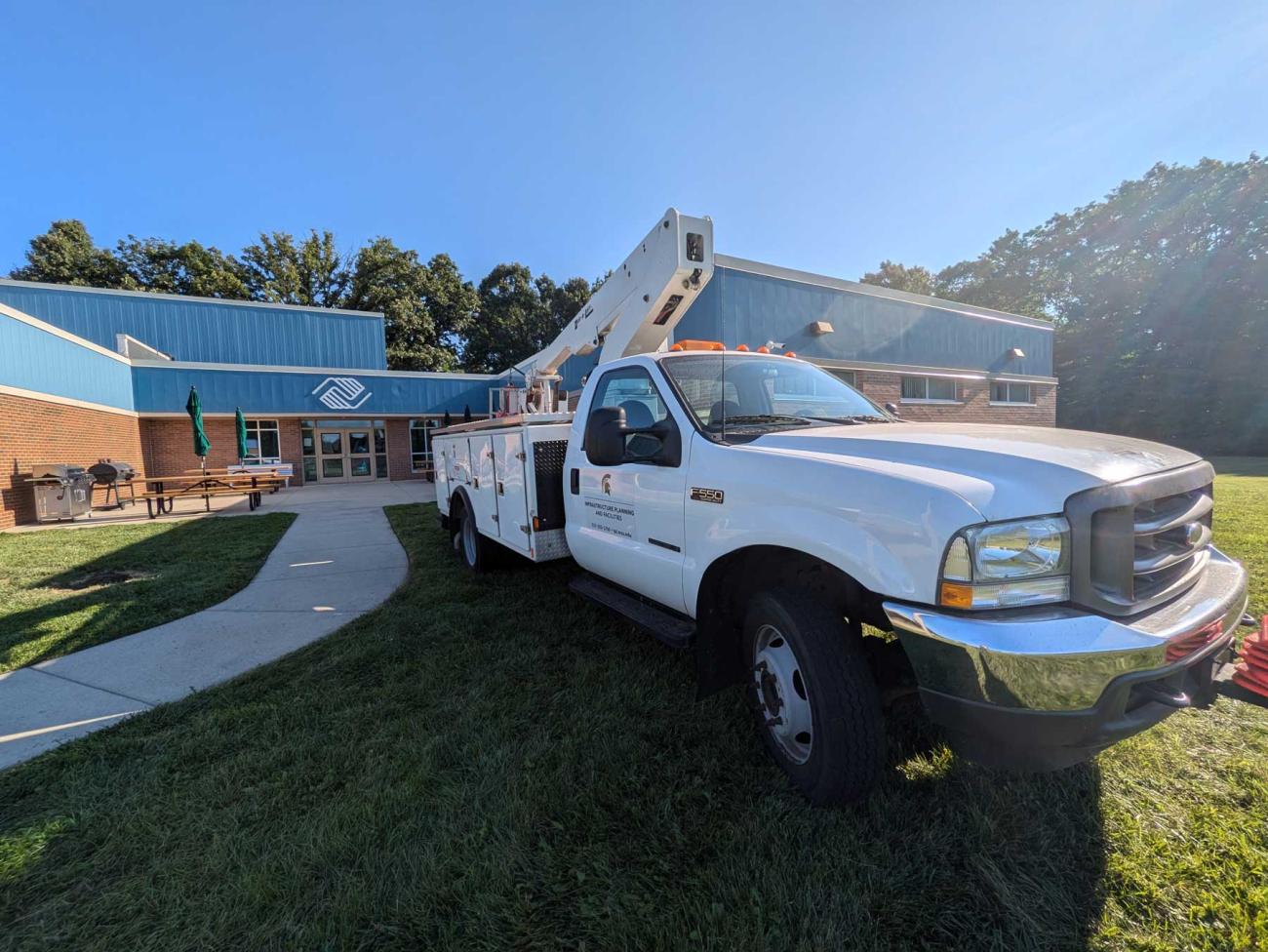
IPF's Landscape Services volunteered time and resources to Lansing's Boys and Girls Club.
Awards and Recognition
- Custodial Excellence. IPF Custodial Services earned the “Outstanding Custodial Program” award at the JaniCon Conference.
- Innovation in Technology. The STEM Teaching and Learning Facility received the ASHRAE Technology Award for its groundbreaking HVAC systems.
- APPA Article of the Year. IPF received the Rex Dillow award for its article on mobile technologies connecting people to campus spaces.
- Beautification Award. Hidden Lake Gardens was awarded the Greater Lenawee Chamber of Commerce Beautification Award and the Spruce Award for Beautification Excellence from the Irish Hills Region Chamber of Commerce.
IPF’s commitment to its mission is evident in these accomplishments, from sustainability milestones to operational enhancements that prioritize the MSU community's needs. Together, these efforts reinforce IPF’s role as a leader in creating a campus that helps Spartans to change the world.
